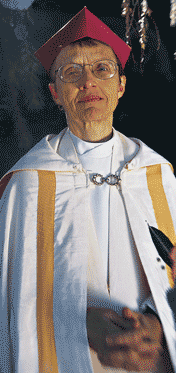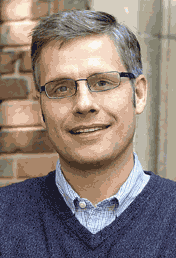
 |
||
The Yale Alumni Magazine is owned and operated by Yale Alumni Publications, Inc., a nonprofit corporation independent of Yale University. The content of the magazine and its website is the responsibility of the editors and does not necessarily reflect the views of Yale or its officers. |
|
The Queen’s Professor The September announcement from Number 10 Downing Street signaled Yale’s impending loss: “The Queen has been pleased to approve that Professor Marilyn McCord Adams be appointed Regius Professor of Divinity in the University of Oxford.” And so at Christmastime, philosophy professor Adams will go to Oxford’s college of Christ Church to take up a post that unites the two strands of her career: as a scholar, she will lecture in her fields of medieval and contemporary theology; as an Episcopal priest, she will serve as a canon (staff priest) at Christ Church Cathedral.
The native of rural Illinois, who was teased as a girl for her bookishness, will fill one of Oxford’s oldest chairs, established by Henry VIII in 1546. The professorship is considered at Oxford to be primus inter pares, first among equals. The British broke barriers in naming Adams: she is both the first American and the first woman to fill the professorship. “It’s a maverick appointment,” says Adams, “but on the other hand, I do teach Christian doctrine, and I am going to love going to services and being a canon.” But are the British ready for a priest whose going-away present from her local church is a priest’s vestment—made of black leather? The unorthodox garment symbolizes Adams’s support for the inclusion of gays, lesbians, and bisexuals in the Anglican Communion. “I will take it with me,” says Adams, “because after all, these troubles with the gay issue have not gone away.” Speaking of her own adventure, Adams comments: “It does seem a little bit of a fairy tale.” Reading Latin for Fun and Profit Historian Anders Winroth has spent years analyzing a medieval Latin document written by a man about whom he knows almost nothing. The manuscript is by Gratian of Bologna, possibly a bishop, who scratched one of the Western world’s first law books into wax tablets—a 207-page compendium of canon law. Gratian’s Decretum has shaped law to this day. And Winroth’s work on it was handsomely rewarded this fall with an elite MacArthur Fellowship.
Canon law governed both sacred and secular life in 12th-century Europe. From Gratian’s work and the writings of the sixth-century Roman Justinian, medieval legal scholars formulated the ius commune, or European common law. Gratian articulated the right not to incriminate oneself (our Fifth Amendment) and the concept of quod omnes tangit: what concerns everyone must be decided by everyone. (Hence elected representatives, not presidents or kings, should set taxes, a principle argued by Boston colonists.) Bologna in Gratian’s time was a center for legal scholars, who journeyed from as far as Iceland to study there. “These people connected in Latin, which was the mother tongue of nobody but the lingua franca of everybody,” Winroth says. What he calls “the beauty of the language” connected Winroth himself, as a teenager, with medieval history. Son of a factory worker, he grew up in Ludvika, Sweden; he has been a professor at Yale since 1998. Winroth is known in medievalist circles for having resolved a centuries-old problem: he distinguished between two versions of Gratian’s text, explaining troubling inconsistencies by proving that one version preceded the other. One day in September, a man called Winroth from the John D. and Catherine T. MacArthur Foundation and began describing the foundation’s mission of supporting “individuals who have shown extraordinary originality.” Winroth recalls thinking: “He wants me to write a recommendation for somebody.” Instead, the man told Winroth that he was one of 24 fellows chosen this year by an anonymous committee to receive a $500,000 no-strings-attached grant. Although Winroth speaks four languages, all he could manage to say was “Wow,” over and over again. |
||||||
|
|
|
|
|
|
|
|
©1992–2012, Yale Alumni Publications, Inc. All rights reserved. Yale Alumni Magazine, P.O. Box 1905, New Haven, CT 06509-1905, USA. yam@yale.edu |
||

